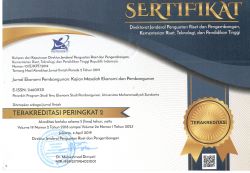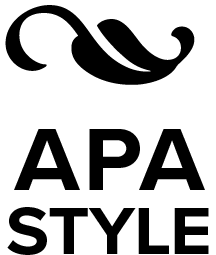The Economic and Sharia Value of Moslem’s Awareness for Halal Food in Indonesia
Indah Susilowati(1*), Edy Edy Riyanto(2), Mayanggita Kirana(3), Izza Mafruhah(4), Alias Radam(5)(1) Faculty of Economics and Business, Diponegoro University
(2) Faculty of Economics and Business, Diponegoro University, Semarang 50275, Indonesia. Jl Erlangga Tengah 17 Semarang 50241.
(3) Faculty of Economics and Business, Diponegoro University, Semarang 50275, Indonesia. Jl Erlangga Tengah 17 Semarang 50241.
(4) Faculty of Economics and Business, Sebelas Maret University, Surakarta, Indonesia, Jl Ir Sutami no 36 Jebres Surakarta
(5) 5Faculty of Economics and Management. Universiti Putra Malaysia. 4300 Selangor Darul Ehsan Malaysia
(*) Corresponding Author
Abstract
The concept of halal products or foods is now gaining a worldwide discussion due to its recognition as an alternative benchmark for safety, hygiene and quality assurance of what we consume or drink daily. For a moslem consumer, halal foods and drinks means that the products has met the requirements laid down by the Shariah law. It represents the symbol of hygiene, quality and safety product when produced strictly under the Holistic Halal Assurance Management System. It is expected with halal certification to ensure the halal of food consumed by moslem in Indonesia could increase the sharia and economic values for the moslem in Indonesia. Indonesia is a huge market for halal product, and has just legalized regulation on halal product guarantee. The recent dynamics urge the importance of knowledge of consumer’s behavior on halal product.
This study is aimed to explore an economic and sharia values of moslem awareness in Indonesia with a pilot project in Semarang City. The standard of halal used are defined from the points of: (1) input or material come from; (2) how to get the input; (3) how to process the input; (4) how to store the input; (5) how to transportage the input; and (6) how to package and serve the input. Mixed-method of quantitative and qualitative had been invoked to analyse the data.
The results indicated that the level of awarness for consuming the halal food are vary among the moslem community by her/ his income- and sharia-stratum as perceived by them. It is hardly difficult to aware people of A-B-G-C accordingly for halal food in such high intense of diversity in community in short-term. Of course, a lot of efforts and strong committment among the stakeholders is indeed needed to ensure the halal food consumed by moslem in Indonesia.Keywords
Full Text:
PDFReferences
Abdul Manaf, B., Cheng, W. H., & Nurwahida, F. (2013). The competitiveness of halal food industry in Malaysia : A SWOT - ICT analysis. Journal of Society and Space, 1(1), 1–9.
Abdullah, A. N. Bin. (2006). Perception and Awarness Among Food Manufacturess And Marketers on Halal Food in The Klang Valley. Universiti Putra Malaysia.
Anggara, F. S. A. (2017). Development of Indonesia Halal Agroindustry Global Market in ASEAN: Strategic Assesment. Al Tijarah, 3(1), 82. https://doi.org/10.21111/tijarah.v3i1.940
Bergeaud-Blackler, F. (2004). Social definitions of halal quality: the case of Maghrebi Muslims in France. (M. Harvey, Ed.), Qualities of food. Manchester: Manchester University Press. Retrieved from ://CABI:20053120395
Cutler, B. T. R. (2007). Food Safety Drives Growth in Kosher & Halal Foods. Ifsqn. Florida.
Elasrag, H. (2016). Halal Industry : Key Challenges and Opportunities. Muenchen.
John Creswell. (2014). Research Design Qualitative, Quantitative and Mixed Methods Approaches (4th ed.). Los Angeles: Sage Publication Ltd.
Melissa, W., & Hassan, W. (2015). Halal Food in New Zealand Restaurants : An Exploratory Study Halal Food in New Zealand Restaurants : An. Int.Journal of Economics and Management, 3(October), 385–402.
Salman, F., & Siddiqui, K. (2011). An exploratory study for measuring consumers awareness and perceptions towards halal food in Pakistan. Interdisciplinary Journal of Contemporary Research in Business, 3(2), 639–651. https://doi.org/10.7763/IJSSH.2015.V5.413
Shikoh, R. U. (2015). Halal Business: The New Global Market Paradigm. Tokyo.
Wahab, A. R. (2004). Guidlines for the preparation of halal food and goods for the Muslim consumers. AmalMerge (M) Sdn. Bhd. Retrieved from http://www.sudairy.com/mer/halal_guidelines_1.pdf
Wilson, J. A. J., & Liu, J. (2010). Shaping the Halal into a brand? Journal of Islamic Marketing, 1(2), 107–123. https://doi.org/10.1108/17590831011055851
Article Metrics
Abstract view(s): 1655 time(s)PDF: 1227 time(s)
Refbacks
- There are currently no refbacks.















